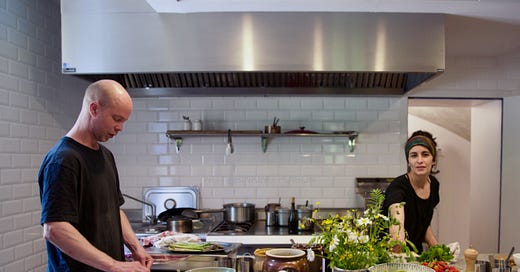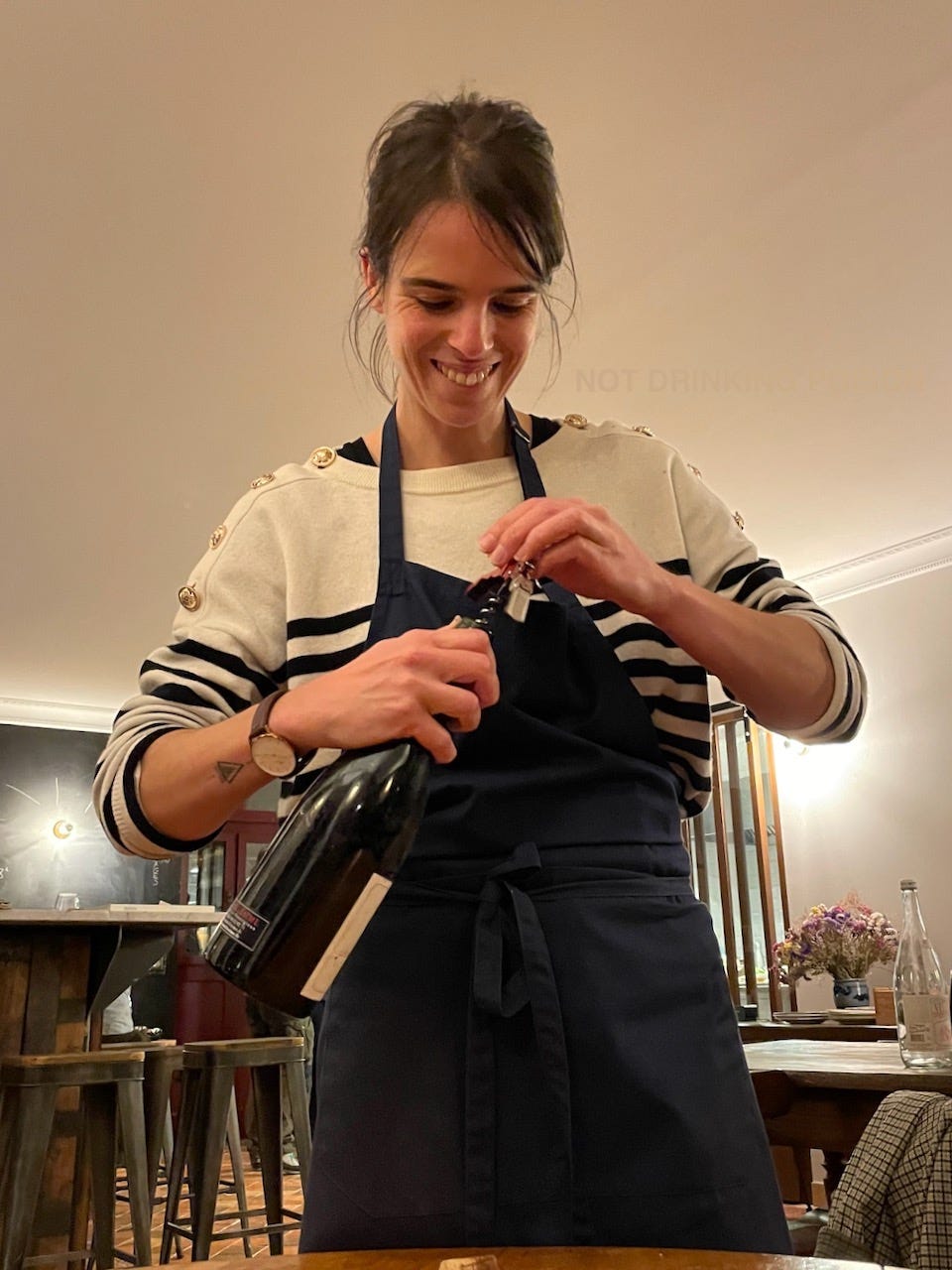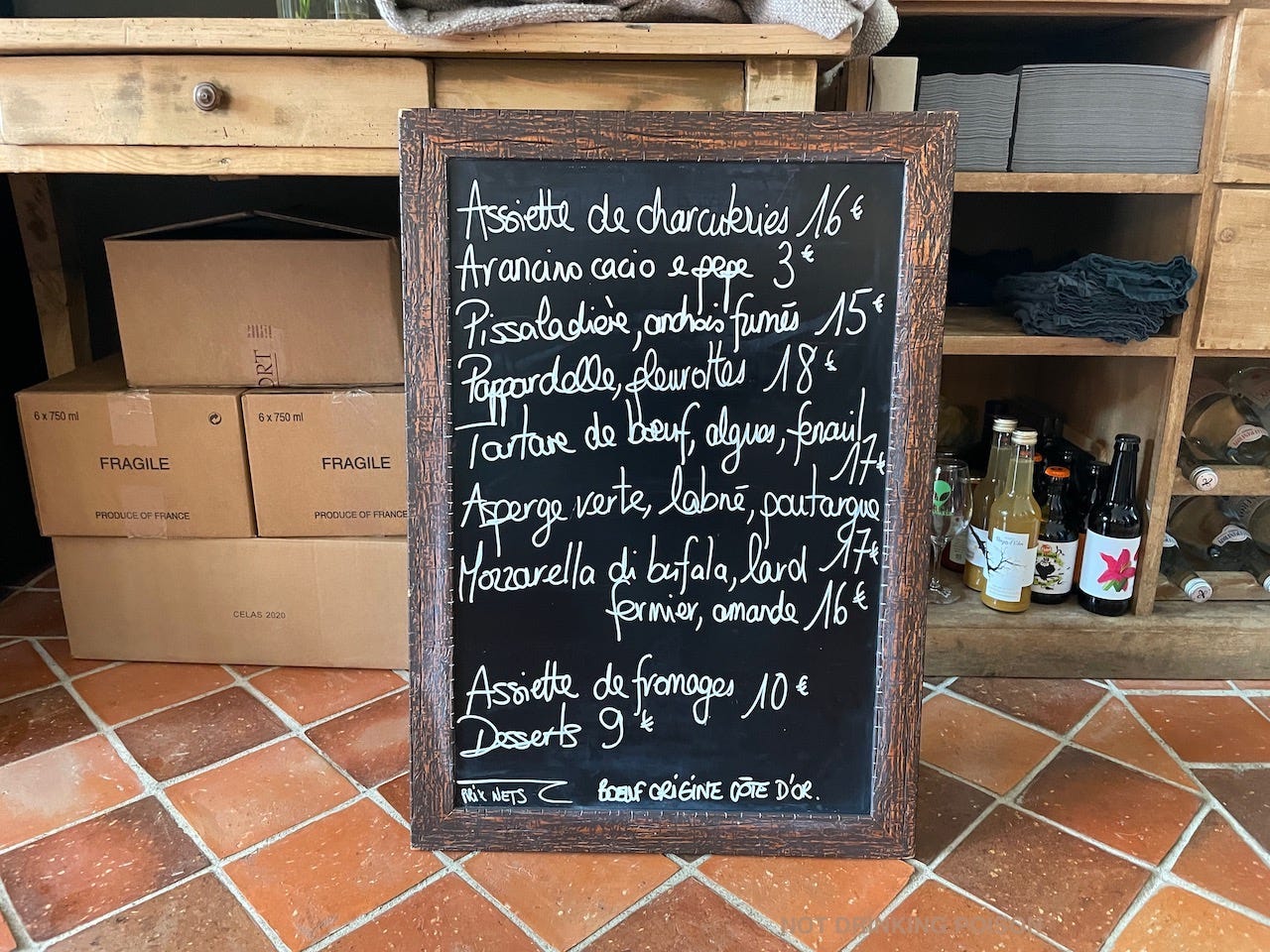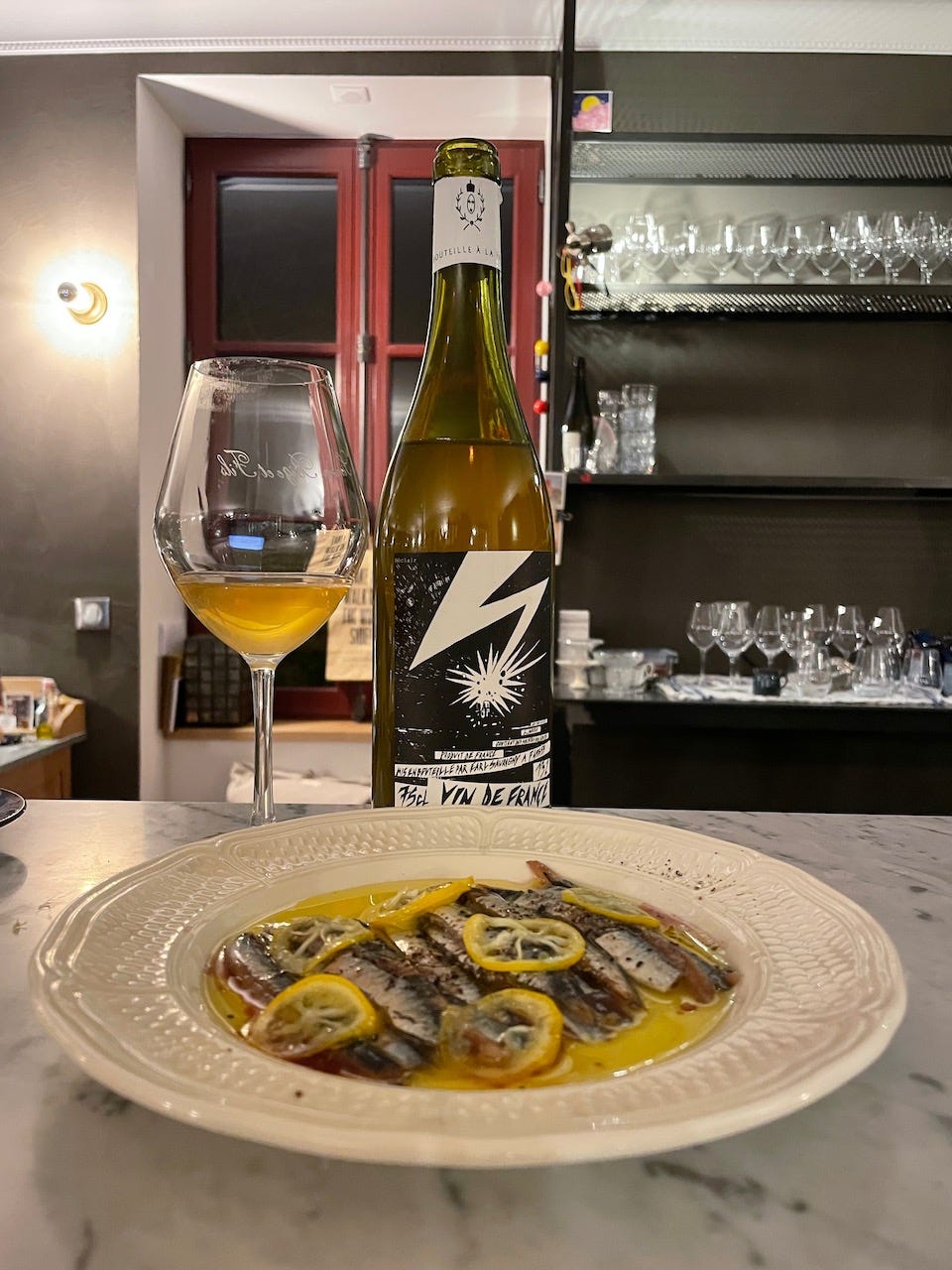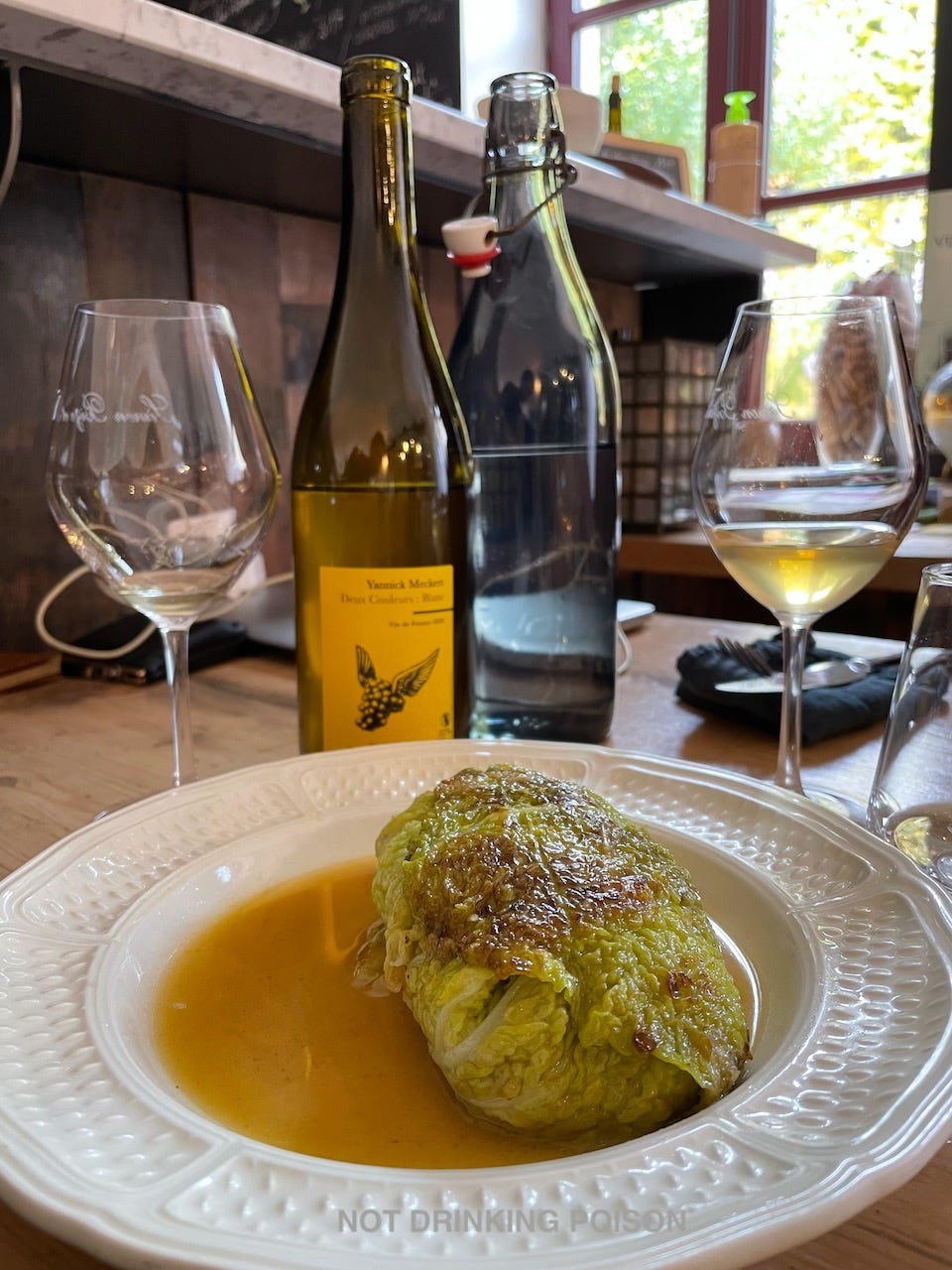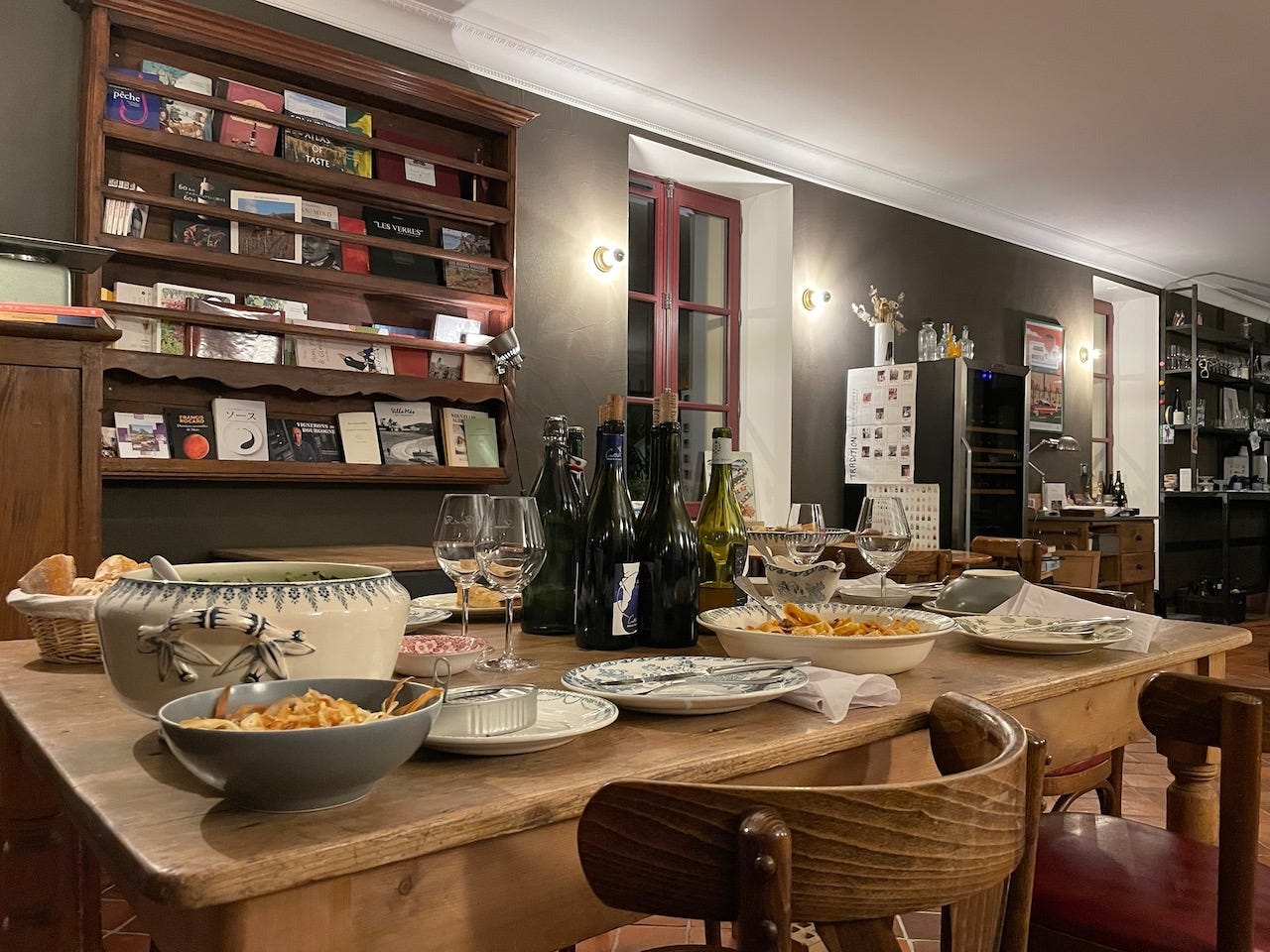At Le Soleil in Savigny, Towards A Kitchen Without Plastic
Chefs Laila Aouba and Svante Forstorp on their efforts to banish plastic from their kitchen - and what it means for their cooking.
Founded by Lola Taboury-Bize in 2020, Savigny-lès-Beaune bistrot-auberge Le Soleil has quietly come to rank among the most elegant and innovative restaurant experiences of post-COVID France. Sunday afternoons, in particular, bring a who’s-who of vignerons, chefs, and restaurateurs to the restaurant’s airy, park-adjacent courtyard, drawn by Taboury-Bize’s beautiful, gem-studded wine list, her understated hospitality, and the painstaking, refined cuisine of her duo of chefs, Laila Aouba and Svante Forstorp.
The couple’s menu at Le Soleil is characterized by an ostensible simplicity, emphasizing seasonal local produce and foregrounding vegetables with minimal transformation. Yet the construction of each dish at Le Soleil reflects certain radical limitations the couple have adopted in their kitchen as matters of principle, notably the elimination of the position of dishwasher, and the strict avoidance of the use of plastic in the kitchen. The couple forswear plastic cartons, cling film, and piping bags, employing stainless steel boxes and ceramic bowls, modifying their methods as necessary.
Forstorp considers the avoidance of plastic in the kitchen a logical extension of an awareness of the effects of fermentation and aging containers on wine. For her part, Taboury-Bize says she didn’t bat an eyelash when her chefs suggested eliminating plastic from the restaurant’s kitchen. Having opened her restaurant four days before France’s first lockdown, she had grown frustrated with the amount of packaging she’d been obliged to use when she did take-away service with a previous chef.
“I was already into that idea,” she says. “So I never thought about the cost. It seemed quite normal.”
Normal or not, what results from Le Soleil’s self-imposed limitations is a concise range of dishes tuned to a remarkably delicate nuance of flavor, each one seeming to reflect the patience and spontaneity of the chefs’ gestures.
I spoke to Forstorp and Aouba in mid-May about what it’s like to cook without plastic. For a tasting of their cooking, check out Aouba’s guest recipe.
SVANTE FORSTORP AND LAILA AOUBA: AN INTERVIEW
The following interview was conducted while the couple were prepping for lunch service on Friday, May 13th. It has been condensed and edited for clarity.
When did you first start to think about cooking without the use of plastic?
SVANTE FORSTORP: I was very influenced by people I worked for at La Trèsorerie, near Château d’Eau in Paris. It was a boutique and café inspired by [Paris fashion and homeware boutique] Merci. This would have been after my time at Aux Deux Amis. It was a Scandinavian-inspired, good-quality, kitchenware and interior shop. They were very into this idea of fine materials. That left a huge mark on me.
That was the beginning. Then I had a carte blanche at Vivant. And I started finding ways to do without plastic - slowly, slowly. I wanted to adapt, as best we can, the approach of the natural winemaker, to our ways of cooking. Not adding too much sugar, not adding too much vinegar, looking for all those properties in the ingredients themselves. And one of the ways, is this question, once the flesh of the grapes - or the food - has been exposed, what is it in contact with?
For me, it was like an allergic reaction, instantly. The awareness that there is a communication between the food and the container. It’s like when you put tomato sauce in a plastic container. Even if you wash it at 100°C afterwards, it stains the container. I thought, how is it possible that people don’t talk about this?
With wine, we talk about stainless steel, we talk about amphorae, and all these things. But with the food we eat, this has been cut out. No one is talking about it. Unbelievable.
So you began starting to cook without plastic at La Trésorie, and refined it at Vivant, and continued it at Achille, with Pierre Jancou.
SF: We carry it through until today, in the way that we’re living, and how we’re trying to live. Not imposing it on other people. But with our house furnishings, for instance.
Laila, had you worked in a kitchen without plastic before meeting Svante?
LAILA AOUBA: At Yard, when I started working with Svante, he wasn’t using plastic there, either. But nowadays it’s back, at Yard.
SF: Even in Switzerland, where I worked briefly, I told them I had one condition: we remove all the plastic, and I’m there. It’s something that I talk about. If we can’t do that, I can hang up the phone.
Would you say it takes a greater engagement, on the part of the owners of a restaurant, to let you cook without plastic?
LA: Yes, because the stainless steel containers we use have a cost. But, over time, it costs less than using plastic.
SF: It takes more engagement, it definitely takes more.
Certainly more preparation the day-of, I imagine?
SF: Yeah, definitely. Of course.
There is still the issue of plastic coming from suppliers, I imagine?
LA: You have things coming from the suppliers with plastic. We try to work with them to remove them. But we have to find other options to propose to them. For now, idea is to remove the plastic immediately. But when we calculate the amount of plastic that we have in the bin, it’s way less than I’ve ever seen in kitchen.
This is why I never say, '“zero plastic.” But towards “zero plastic.” The cutting boards, for example, we could use wood, but then we’re fucked if there’s a check-up.
Because it’s not legal to use wooden cutting boards.
LA: No.
SF: With wooden cutting boards, it’s a yes and no. I was more romantic about it for a long time. But the hygiene isn’t good. EVA - ethylene-vinyl-acetate - is way easier to maintain.
Are there dishes you’ve had to abandon or modify because you realized you couldn’t do them without plastic?
LA: Yes. Terrines, for instance. If you want to make them, it’ll last a week, or whatever, but terrines take a lot of energy with the grinder and stuff. It’s better to do big amounts at a time. But if you do big amounts, you need to use sous-vide. A friend of ours, a great Australian chef, calls sous-vide cooking a condom for the ego. Because it doesn’t allow for any surprises. Everything is perfect and quicker and easier. You come in with your tongs and a garnish at the end and you have a perfect plate.
We prefer to work by feeling. Technically, we do everything with more steps.
SF: In a way, it’s more labor-intensive, which admittedly is not what we need today in the restaurant world. Preparing everything fresh, without stocking things up in boxes.
How else does working without plastic boxes affect your rhythm in the kitchen at Le Soleil?
LA: Also with the kitchen closure. Generally, people use as many plastic boxes as they can and they just throw them to the dishwasher.
SF: And you never become a good chef that way.
LA: I wanted to eliminate the position of the dishwasher. Because the fact of working in great restaurants and then having to wash dishes, it puts the ego back in the right place. Seventy percent of your time, you’re cleaning.
So the obligation to clean up after oneself affects one’s kitchen habits in a positive way?
SF: Why is there a staff shortage in the restaurant industry? I think it’s because during COVID closures, people in France went on partial-unemployment, and it worked pretty well. And they were like, “Wait, we’ve been pretty much screwed for years and years. We don’t want to go back and do that.”
But for things to change, the food is going to have to change. Because French food is very labor-intensive. All these sauces, and dealing the bones, and straining it… People need to be aware that for all of this to continue, the price of good food needs to be higher.
LA: And it’s not just having caviar on the dish that makes it considered good food that’s worth a high price. It’s the time spent peeling asparagus, checking asparagus one after another, trying to find the best way to express the flavor of it, without transforming it too much. That’s worth the price!
SF: Good, happy people with good intentions, pretty much, is what makes good food.
FIN
Le Soleil
1 All. des Tilleuls
21420 SAVIGNY-LES-BEAUNE
FURTHER READING
Issue 7’s Guest Recipe: Laila Aouba’s Asparagus, Labneh, and Bottarga.
My 2014 blog post on Forstorp’s work at Vivant Cave.

